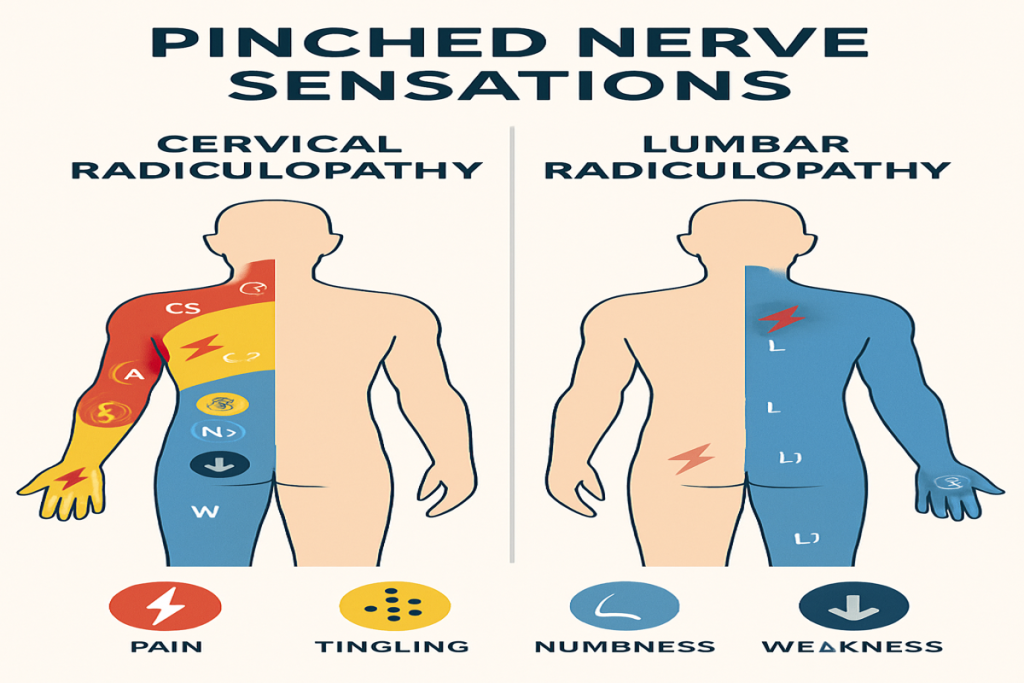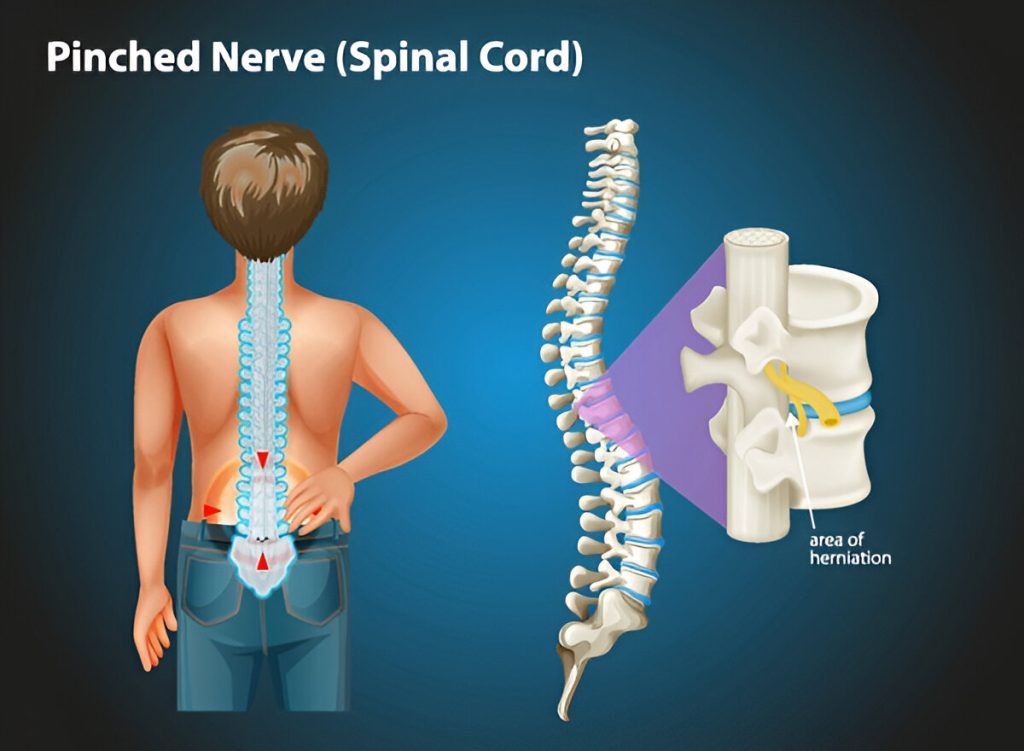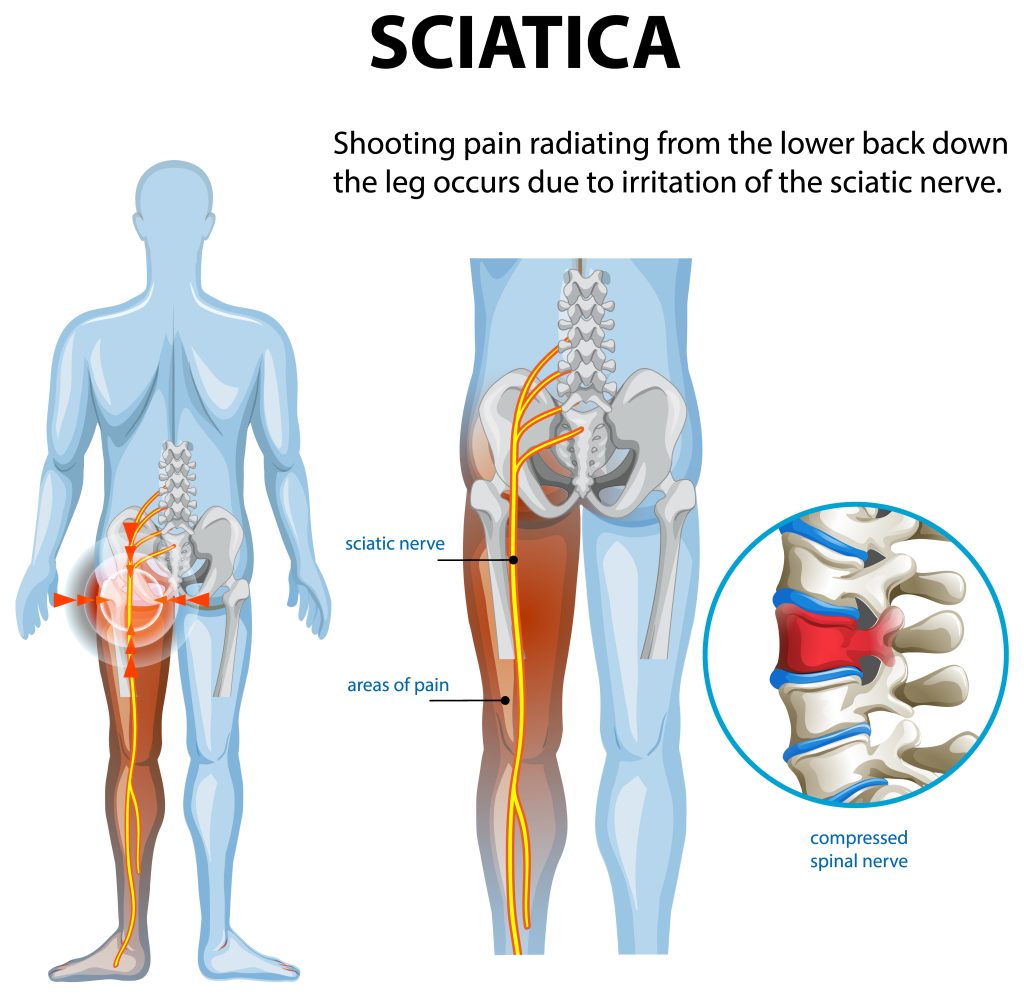What Does a Pinched Nerve Feel Like?
A pinched nerve is one of the most common causes of pain, tingling, and numbness in the body. Many people notice alarming sensations—such as burning, sharp shooting pains, or muscle weakness, and wonder “what does a pinched nerve feel like?” At King’s Spine Centre, we frequently see patients with these symptoms and guide them toward a clear diagnosis and effective treatment.
This article explains what a pinched nerve actually feels like, how it differs depending on location (neck, back, or leg), and when to seek medical help.
What is a Pinched Nerve?
A pinched or compressed nerve occurs when surrounding tissues, such as bones, muscles, ligaments, or discs, put too much pressure on a nerve. This disrupts normal nerve signaling and leads to uncomfortable sensations.
The sensation is often described differently depending on where the nerve is compressed: in your neck (cervical spine), lower back (lumbar spine), or other areas like the leg or knee.
What Does a Pinched Nerve Feel Like?
Many patients search for answers by asking “what does a pinched nerve feel like,” “what does pinching a nerve feel like,” or even “what do pinched nerves feel like.” This is because the symptoms can be confusing and vary from person to person.
The reality is that a pinched nerve can feel different depending on its location and severity. Some people describe it as a stabbing or sharp pain that comes suddenly, while others experience a persistent dull ache that never seems to go away. Many patients also report pins and needles sensations, numbness, or a tingling feeling that travels along the affected nerve pathway.
For instance, what does a pinched nerve in your neck feel like? Often, it starts as stiffness or soreness in the neck and then radiates into the shoulders, arms, or even the hands. Some describe it as a burning or electric shock sensation when turning the head or lifting the arms.

Similarly, what does a pinched nerve in the lower back feel like? Patients frequently compare it to sciatica pain with sharp shooting discomfort that travels down the leg, sometimes reaching as far as the foot. It may also feel like deep pressure or a throbbing ache that worsens with certain movements or prolonged sitting.
Another common question is what does a pinched nerve look like? While there is no visible sign on the skin, the symptoms such as pain, numbness, or muscle weakness signal that the nerve is under stress or compression.
Understanding these sensations is the first step toward relief. If you recognize these symptoms, seeking medical evaluation early can prevent long term nerve damage and help you find the right treatment.
General Sensations of a Pinched Nerve
A pinched nerve can create several distinct feelings:
Sharp, shooting pain that radiates along the nerve’s pathway
Tingling or a “pins and needles” sensation, similar to a limb “falling asleep”
Burning pain, often worse with movement or at night
Muscle weakness in the affected area
Numbness or reduced sensation in part of the body
A feeling of heaviness, making certain movements harder than usual

What Does a Pinched Nerve in the Neck Feel Like?
Cervical (neck) nerves can become pinched due to arthritis, disc problems, or poor posture. Symptoms often include:
Radiating pain from the neck into the shoulder or arm
Tingling or numbness in the fingers
Muscle weakness in the arm
Patients asking “what does a pinched nerve in your neck feel like” often report a burning or stinging sensation that worsens with head movement also describe it as an electric shock traveling down the arm.
What Does a Pinched Nerve in the Back Feel Like?
The lower back is one of the most common areas for nerve compression, especially involving the sciatic nerve. Patients often ask “what does a pinched nerve in lower back feel like” and describe symptoms such as:
Sharp, stabbing pain in the lumbar region
Deep, aching discomfort that may turn into shooting pain down the leg
Tingling or numbness spreading into the buttocks or thighs
Pain that ranges from a dull ache to intense, unbearable discomfort depending on posture and activity
Associated symptoms include:
Pain radiating into hips, buttocks, and legs
Difficulty standing for long periods
Numbness or weakness in the leg muscles

What Does a Pinched Nerve in the Leg Feel Like?
When compression affects nerves leading into the leg (such as with sciatica), patients often ask “what does a pinched nerve in leg feel like.” Common sensations include:
Shooting pain that travels down the thigh or calf
Burning, tingling, and weakness that typically affect one leg
Numbness that feels like the leg has “fallen asleep,” but lasts much longer
Persistent pain that worsens with prolonged sitting or standing
Muscle weakness that may lead to difficulty walking

What Does It Feel Like to Pinch a Nerve?
Some patients wonder “what does it feel like to pinch a nerve?” The experience can be sudden like tweaking your back while lifting or gradual, worsening over weeks. It often feels like:
A sharp, stabbing sensation at the point of compression
A zap of electricity when you move a certain way
Tingling spreading into nearby areas
When to See a Doctor for a Pinched Nerve
While mild pinched nerves sometimes improve with rest, ice or heat therapy, and posture correction, there are times when prompt medical evaluation is essential:
-
Persistent numbness or tingling
-
Muscle weakness or difficulty moving the arm or leg
-
Loss of bladder or bowel control (urgent emergency)
-
Pain that doesn’t improve after several weeks
At King’s Spine Centre, our specialists provide physical examinations and imaging (MRI, X-ray) to identify the cause and recommend treatment.

Treatment Options for a Pinched Nerve
Depending on severity, treatment may involve:
Rest and activity modification – avoiding triggers that worsen pain
Physical therapy – improving posture, flexibility, and core strength
Medications – anti-inflammatory drugs or muscle relaxants
Steroid injections – to reduce swelling around the nerve
Surgery (only when necessary) – if conservative treatments fail or weakness worsens
What’s a Pinched Nerve Healing Like?
As nerves recover, patients often ask “what does a pinched nerve feel like when it is healing?” Signs may include:
Pain decreasing gradually
Tingling turning into mild numbness before sensation returns
Strength improving little by little
Recovery can take a few days to several weeks, depending on the cause and treatment.
Read – How long does it take for nerves to heal after back surgery?
How King’s Spine Centre Can Help
At King’s Spine Centre, we specialize in diagnosing and treating pinched nerves with a patient-centered, evidence-based approach. Our team guides you through:
Precise diagnosis using advanced imaging
Personalized treatment plans including therapy and medications
Guidance on at-home care to promote recovery
Surgical solutions for severe cases, when necessary
Whether you wonder “what does a pinched nerve in the back feel like” or worry about “what does a pinched nerve in your neck feel like,” our experts help patients regain mobility, reduce pain, and restore quality of life.
Key Takeaway
So, what does a pinched nerve feel like? It can feel like:
Tingling, burning, or pins-and-needles
Sharp shooting pain down your arm, leg, or back
Weakness or numbness in affected areas
Pinched nerves vary widely depending on their location, but what’s common is the impact on daily life—making simple activities like sitting, walking, or even sleeping uncomfortable. The good news is that with early treatment, recovery becomes easier and the risk of long-term damage is greatly reduced.
At King’s Spine Centre in Dubai, our spine specialists use advanced diagnostics and personalized treatment plans to relieve pain, restore mobility, and prevent complications. Whether your nerve pain is in the neck, back, or leg, our expert team is here to help you get back to living pain-free.
Don’t ignore the warning signs. Book your consultation at King’s Spine Centre today and take the first step toward lasting relief.
Frequently Asked Questions (FAQs)
Yes, stress and anxiety can increase muscle tension, which may worsen nerve compression and amplify pain or tingling sensations.
While pinched nerves themselves are not directly inherited, conditions like spinal disc degeneration or structural abnormalities can run in families and increase risk.
Yes, poor sleeping posture can aggravate nerve compression, especially in the neck or lower back, leading to increased pain or numbness overnight.
Targeted physical therapy and gentle stretching can relieve pressure on the nerve, but high-impact or improper exercises may worsen symptoms.
A pinched cervical nerve can sometimes cause tension headaches or radiating pain to the head, shoulders, or upper back.
Doctors use physical exams, nerve conduction studies, and imaging such as MRI or X-rays to identify nerve compression without invasive procedures.
Yes, severe nerve compression in the lower back or leg can lead to weakness or numbness, which may affect balance and gait.
If untreated, prolonged compression can lead to permanent nerve damage, including chronic weakness, numbness, or muscle atrophy.
Rest, ice or heat therapy, posture correction, and gentle stretching can help, but persistent symptoms require professional evaluation.
Yes, pinched nerves can occur in the wrist (carpal tunnel), shoulder, or even the hip, depending on nerve compression locations.
Medical Disclaimer
This blog is for informational purposes only and is not a substitute for professional medical advice, diagnosis, or treatment. Always consult your physician or a qualified healthcare provider regarding any medical questions or concerns.
Review Note
This content has been medically reviewed by the spine care team at King’s Spine Centre, Dubai, to ensure accuracy and relevance. Our team follows evidence-based guidelines and uses advanced diagnostic tools such as MRI and CT scans to evaluate spinal conditions.


